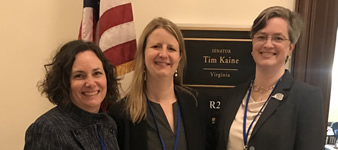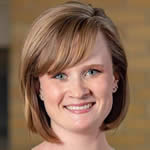
(L-R) Stefanie Warlick, Andrea Adams, KT Vaughan
Andrea Adams is the Interim Associate Dean in Libraries at James Madison University. She is responsible for leading online learning, faculty development, media production services, makerspaces, and classroom technologies in the libraries. Andrea has been in the educational field for over 20 years, including both K-12 and higher education. She received her MS.Ed in Educational Technology at James Madison University and a B.S. in Technology Education at Virginia Polytechnic Institute and State University.
With her diverse experiences in the health and life sciences, teaching and research, facilities operations, community outreach, and management, KT Vaughan brings an optimistic and inclusive perspective to library leadership. After seven years at James Madison University, including as the director of the science library and as Associate Dean, KT will join the Washington & Lee Library as Higginbotham University Librarian on June 1, 2020. Asking questions about – and driving change in – the future of libraries is a central theme of KT’s career. She is currently focused on building inclusive and equitable library environments for people with disabilities, scholarly and digital communication in resource-constrained contexts, and the career advancement and professionalism of library staff and faculty. KT holds the MSLS from UNC-Chapel Hill (2001) and an EdD from Arizona State University (2019). Her dissertation, “Building an Inclusive Library through Staff Accessibility Training” is available via the ASU and JMU institutional repositories.
Stefanie Warlick serves as an Interim Associate Dean of Libraries at James Madison University (JMU). A role she has held since July 2018. Stefanie previously held the position of Director of Public Services at JMU. Stefanie received a Master of Science in Library Science from the University of North Carolina at Chapel Hill in 2006.
In the spring of 2018 the JMU Libraries started an eighteen-month period of great change, including the dean’s resignation and an associate dean’s retirement. A newer Associate Dean and two Interim Associate Deans, working with an interim administrator with no library experience, lead and managed the organization during this period. This included helping the organization process the previous dean’s departure, maintaining our high service quality and strong relationships on campus, and preparing for the selection and arrival of the new dean.
The interim administrator had a clear mandate to “press pause” on new programs and services. This was to avoid creating conflicts with any vision or changes that a new dean would want to put into place. However, no organization can truly pause its development for a significant amount of time. Over this 18-month period the Libraries changed its organizational name, released a completely rebuilt website, hired 20 new staff and faculty including a new dean (~14% of the total staff), developed needed foundational policy and procedure documents, and prepared for substantive progress in areas such as digital scholarship and scholarly communication.
The ADs addressed the tension between maintaining and innovating services by focusing on modeling transparent and collaborative leadership. This started with the development and sharing of six strategic priorities on which the ADs would focus during the interim period. These six priorities provided a framework for the administration’s work, as well as for communicating out what was on pause vs. what was moving forward during the period. For example, work in one priority, “Continue to develop a shared understanding of roles and expectations particularly in the area of decision-making,” included improving equity in making resource allocation decisions for space, positions, and finances. Second, the ADs dramatically increased the quantity and variety of communication that they shared with the organization. This was to counter concerns about the organizational culture, which was tending towards untrusting and anti-inclusive, and to better recognize individual and team accomplishments. Third, they leveraged a collaborative leadership model to accomplish this sometimes difficult and political work in the most transparent, equitable,and sustainable way possible.
This poster will present a brief visual of the JMU Libraries case, followed by example activities and programs tied to each of the six priority areas. It will conclude with thoughts about collaborative and transparent leadership as a means of surviving and thriving both in the now and in the future.
 Meranda Roy, is an Online Learning Librarian at the University of North Texas. Previously, she was the Faculty Development Specialist at the University of North Texas where she taught several graduate courses and numerous workshops for instructors related to pedagogy. In those courses and workshops, she tired various techniques to encourage the development of communities of practice. Her professional interests include teaching, educational technology, academic development, training and development, human resources, and mentoring.
Meranda Roy, is an Online Learning Librarian at the University of North Texas. Previously, she was the Faculty Development Specialist at the University of North Texas where she taught several graduate courses and numerous workshops for instructors related to pedagogy. In those courses and workshops, she tired various techniques to encourage the development of communities of practice. Her professional interests include teaching, educational technology, academic development, training and development, human resources, and mentoring.  Anne Cooper Moore, Dean, J. Murrey Atkins Library, holds an MS in Library and Information Science and PhD in Educational Management and Development. She enthusiastically strives to shape library facilities, collections, and services that meet the continuously evolving needs of a diverse and inclusive public university community. Her research interests include assessment of library activities, library facilities, and information literacy. She has designed study, collaboration, academic support, and classroom spaces in four different academic libraries. She has taught undergraduate and graduate courses in college skills and writing, information literacy, management, and research methods at five different universities. She has been continuously active in RUSA, ACRL, and LLAMA and is currently President of LLAMA. She is also chair of the UNC System University Library Advisory Council.
Anne Cooper Moore, Dean, J. Murrey Atkins Library, holds an MS in Library and Information Science and PhD in Educational Management and Development. She enthusiastically strives to shape library facilities, collections, and services that meet the continuously evolving needs of a diverse and inclusive public university community. Her research interests include assessment of library activities, library facilities, and information literacy. She has designed study, collaboration, academic support, and classroom spaces in four different academic libraries. She has taught undergraduate and graduate courses in college skills and writing, information literacy, management, and research methods at five different universities. She has been continuously active in RUSA, ACRL, and LLAMA and is currently President of LLAMA. She is also chair of the UNC System University Library Advisory Council.
 Dr. Rebecca (Becky) Croxton is the Head of Assessment for J. Murrey Atkins Library at the University of North Carolina at Charlotte. She earned a PhD in educational studies, a doctoral minor in educational research methods, and her MLIS degree from the University of North Carolina at Greensboro (UNCG). Becky is also an adjunct lecturer for the UNCG MLIS program and has taught a variety of courses including Data Visualization and Media Production Services. She previously worked as a Reference Librarian at both Johnson & Wales University’s Charlotte campus and Central Piedmont Community College. She is an active researcher and has published numerous articles and presented nationally on a variety of topics including quantifying the value of the academic library, online learning, professional identity development, and information seeking needs, preferences, and motivation of undergraduate students. She is a member of Association of College & Research Library’s Value of Academic Libraries Committee and is actively involved in the Library Leadership & Management Association (LLAMA) Assessment Community of Practice.
Dr. Rebecca (Becky) Croxton is the Head of Assessment for J. Murrey Atkins Library at the University of North Carolina at Charlotte. She earned a PhD in educational studies, a doctoral minor in educational research methods, and her MLIS degree from the University of North Carolina at Greensboro (UNCG). Becky is also an adjunct lecturer for the UNCG MLIS program and has taught a variety of courses including Data Visualization and Media Production Services. She previously worked as a Reference Librarian at both Johnson & Wales University’s Charlotte campus and Central Piedmont Community College. She is an active researcher and has published numerous articles and presented nationally on a variety of topics including quantifying the value of the academic library, online learning, professional identity development, and information seeking needs, preferences, and motivation of undergraduate students. She is a member of Association of College & Research Library’s Value of Academic Libraries Committee and is actively involved in the Library Leadership & Management Association (LLAMA) Assessment Community of Practice.  Melissa Fraser-Arnott is the Chief of Integrated Reference Services at the Library of Parliament in Ottawa, Canada where she manages a team of embedded subject-specialist research librarians. She has 15 years experience in special libraries and government settings including the Office of the Privacy Commissioner of Canada, the Canadian Department of Foreign Affairs and International Trade, the Centre for International Governance Innovation, and the Canadian Police College. She has a doctorate from Queensland University of Technology through the San José Gateway PhD Program, an MLIS from the University of Western Ontario, and will complete an MBA from the Australian Institute of Business in 2020. She is an active member of SLA, ALA, and ALISE. Her research interests include professional identities, LIS competencies, professional development, and library management.
Melissa Fraser-Arnott is the Chief of Integrated Reference Services at the Library of Parliament in Ottawa, Canada where she manages a team of embedded subject-specialist research librarians. She has 15 years experience in special libraries and government settings including the Office of the Privacy Commissioner of Canada, the Canadian Department of Foreign Affairs and International Trade, the Centre for International Governance Innovation, and the Canadian Police College. She has a doctorate from Queensland University of Technology through the San José Gateway PhD Program, an MLIS from the University of Western Ontario, and will complete an MBA from the Australian Institute of Business in 2020. She is an active member of SLA, ALA, and ALISE. Her research interests include professional identities, LIS competencies, professional development, and library management.
 Maureen Martyn, MLIS (McGill University, 1988), has more than twenty years’ experience working in the Canadian parliamentary milieu. From her early days as a reference librarian to her current role as chief of Branches and Reference Services, Maureen has been involved in many parliamentary projects, including LegisInfo and HillNotes, the Library’s research publications blog. She has held several management positions, including managing multidisciplinary teams at both the Library of Parliament and the House of Commons. She currently manages a team of more than twenty research librarians, senior research librarians and branch managers.
Maureen Martyn, MLIS (McGill University, 1988), has more than twenty years’ experience working in the Canadian parliamentary milieu. From her early days as a reference librarian to her current role as chief of Branches and Reference Services, Maureen has been involved in many parliamentary projects, including LegisInfo and HillNotes, the Library’s research publications blog. She has held several management positions, including managing multidisciplinary teams at both the Library of Parliament and the House of Commons. She currently manages a team of more than twenty research librarians, senior research librarians and branch managers.

 Jill Dawson is the Electronic Resources Librarian at the University of North Texas. Previously, she worked for over a decade in public libraries.
Jill Dawson is the Electronic Resources Librarian at the University of North Texas. Previously, she worked for over a decade in public libraries. Sian Brannon (she, her, hers), the Associate Dean for Collection Management at University of North Texas Libraries, has been in libraries since the 1990s. She has worked in public, academic, and technical libraries, but likes her home library the best. Her research interests include supervision/leadership, internships, assessment, Fear of Negative Evaluation, and randomly, the Technology Acceptance Model. She edits Public Services Quarterly, and is an adjunct professor for Technical Services/Research Methods courses.
Sian Brannon (she, her, hers), the Associate Dean for Collection Management at University of North Texas Libraries, has been in libraries since the 1990s. She has worked in public, academic, and technical libraries, but likes her home library the best. Her research interests include supervision/leadership, internships, assessment, Fear of Negative Evaluation, and randomly, the Technology Acceptance Model. She edits Public Services Quarterly, and is an adjunct professor for Technical Services/Research Methods courses.
 Cory Lampert is the Head of Digital Collections and a Professor at the University of Nevada, Las Vegas. Cory is responsible for leading a robust team responsible for digitization activities, metadata and linked data creation, and digital asset management. Her research interests include linked data, digital library competencies, and strategic planning for digital libraries. She is also active in several service activities focused on libraries and data, mentoring new librarians, and labor issues for contingent digital workers.
Cory Lampert is the Head of Digital Collections and a Professor at the University of Nevada, Las Vegas. Cory is responsible for leading a robust team responsible for digitization activities, metadata and linked data creation, and digital asset management. Her research interests include linked data, digital library competencies, and strategic planning for digital libraries. She is also active in several service activities focused on libraries and data, mentoring new librarians, and labor issues for contingent digital workers.
 Darnelle Melvin is the Special Collections and Archives Metadata Librarian and an Assistant Professor at the University of Nevada, Las Vegas, where he is responsible for managing metadata activities, remediation projects, and metadata documentation. He is co-author of
Darnelle Melvin is the Special Collections and Archives Metadata Librarian and an Assistant Professor at the University of Nevada, Las Vegas, where he is responsible for managing metadata activities, remediation projects, and metadata documentation. He is co-author of  Seth Shaw is an Application Developer for the University of Nevada, Las Vegas, Libraries dedicated to Special Collections and Archives. Previously, he was the Electronic Records Archivist for Duke University and an Assistant Professor of Archival Studies at Clayton State University. He has been developing IT solutions for special collections and archives, off and on, since his days as an undergraduate student.
Seth Shaw is an Application Developer for the University of Nevada, Las Vegas, Libraries dedicated to Special Collections and Archives. Previously, he was the Electronic Records Archivist for Duke University and an Assistant Professor of Archival Studies at Clayton State University. He has been developing IT solutions for special collections and archives, off and on, since his days as an undergraduate student. Dr. Catherine Sassen (she, her, hers) is Principal Catalog Librarian at the University of North Texas. She has published and presented on cataloging, indexing, assessment, career development, and mentoring.
Dr. Catherine Sassen (she, her, hers) is Principal Catalog Librarian at the University of North Texas. She has published and presented on cataloging, indexing, assessment, career development, and mentoring. Nicole Potdevin, (M.A., M.L.I.S.) is the Associate University Librarian and Director of Public Services at Fairleigh Dickinson University’s Florham Campus Library in Madison, NJ. She earned a M.A. in Art History and Archaeology from the Institute of Fine Arts – New York University in 2009, and a M.L.I.S. from Rutgers University in 2014. Nicole’s main areas of interest and research are information literacy, professional development, and assessment in academic libraries.
Nicole Potdevin, (M.A., M.L.I.S.) is the Associate University Librarian and Director of Public Services at Fairleigh Dickinson University’s Florham Campus Library in Madison, NJ. She earned a M.A. in Art History and Archaeology from the Institute of Fine Arts – New York University in 2009, and a M.L.I.S. from Rutgers University in 2014. Nicole’s main areas of interest and research are information literacy, professional development, and assessment in academic libraries. Julia McKenna has been working in libraries for the past 5 years, most recently as the Circulation Services Manager at Jacksonville University. Her experience includes time in almost every part of library operations including circulation, technical services, periodicals, government documents, and ILL. She holds a bachelor’s degree from Jacksonville University and is a current MLIS student at Valdosta State University and MSOL student a Jacksonville University. Julia is a member of the ALA TOLD committee and a current participant in the Sunshine State Library Leadership Institute. She is also the founder of Managerine LLC, an educational platform for new and aspiring female leaders. Her article “So many students, so little time: Practical student worker training in an academic library” was published in the January edition of the Journal of Access Services.
Julia McKenna has been working in libraries for the past 5 years, most recently as the Circulation Services Manager at Jacksonville University. Her experience includes time in almost every part of library operations including circulation, technical services, periodicals, government documents, and ILL. She holds a bachelor’s degree from Jacksonville University and is a current MLIS student at Valdosta State University and MSOL student a Jacksonville University. Julia is a member of the ALA TOLD committee and a current participant in the Sunshine State Library Leadership Institute. She is also the founder of Managerine LLC, an educational platform for new and aspiring female leaders. Her article “So many students, so little time: Practical student worker training in an academic library” was published in the January edition of the Journal of Access Services.